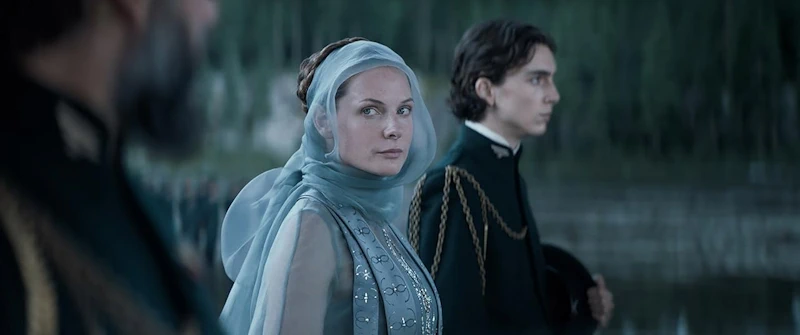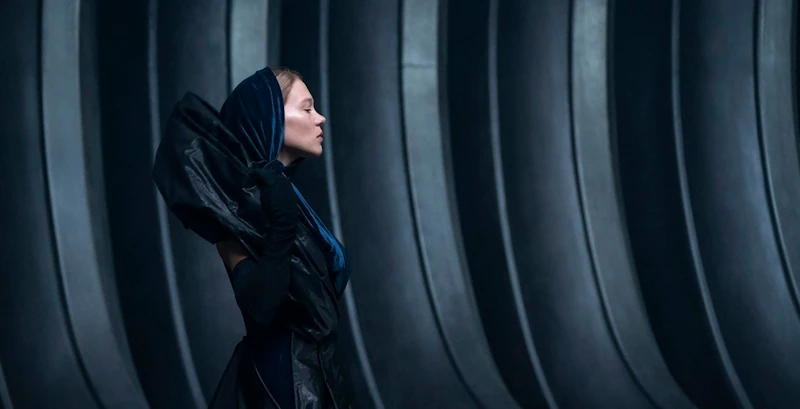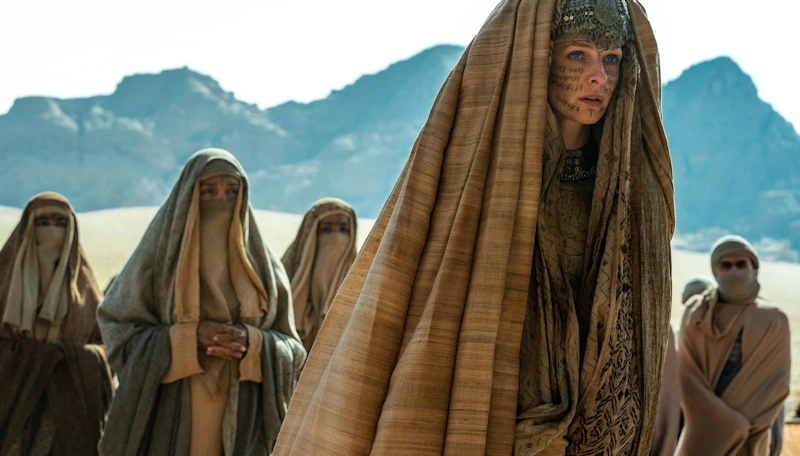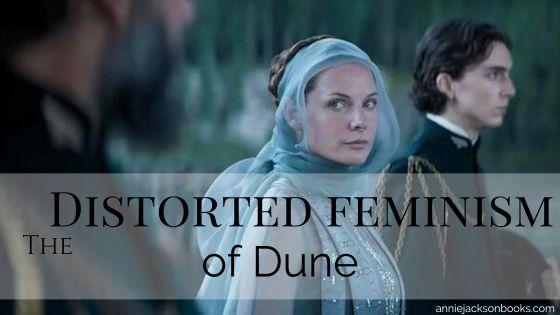SPOILERS ABOUND WITHIN THIS ARTICLE
It might be said that one of the reasons Dune is so well loved is that there are enough elements to the story that readers with different interests can enjoy the same story.
Director Denis Villeneuve focuses on a number of things in his films including Paul’s reluctance to ascend to power, the dynamics of belief, and perhaps most interestingly, the Bene Gesserit.
“I want the movie to be an adaptation about the Bene Gesserit. I want the Bene Gesserit to be at the center of the epicenter of this adaptation. It’s one of the things I feel is the most accurate with our time.”1
It would be interesting to know in what way Villeneuve finds the Bene Gesserit “accurate with our time” since the order of women created by Frank Herbert is both powerful and problematic. Powerful, obviously on the surface. Problematic when diving into the dynamics of power and agency.2

Discussing the Bene Gesserit first requires understanding their sphere of the Dune saga. 10,000 years before Dune, an order is formed, exclusively of women, trained in poise and diplomacy. Fierce in their self-control—mental, emotional and physiological to the point they’re able to control conception, the gender of the embryo, and render ingested poisons harmless. These skills, crucial to the story, are combined with combat training, the Voice which forces others to obey them, and Truthsaying to detect lies.
Women of such innate power then become wives and concubines. This is the first dissonance we encounter, perhaps because Dune was written by a man or because it was written by a man in the 60s. Powerful women are not queens or empresses or warriors. They are good lovers.
Perhaps not even good since the purpose of their entanglements is to manipulate the course of humanity throughout the known universe. The Bene Gesserit use their positions of influence to sway the men they are connected to and through those men, move the universe according to their agenda. Hidden powers. Secret agency moving the players and the universe as “puppet masters of the universe” according to Villeneuve.3
Their primary goal is to engineer bloodlines to create the Kwisatz Haderach, a man capable of surviving the drug-induced ritual that gives those highest in the order access to their genetic memory.4 Why the Bene Gesserit want to create an ultimate power they can’t possess is a bit unclear. Perhaps because their power is limited to the shadows, so they are accustomed to manipulative power rather than direct power.
Here we encounter our second dissonance, however scientific. The Bene Gesserit need a man because with two X chromosomes, they can only access their female ancestral line. A man, with both an X and Y chromosome would be able to access both his male and female ancestral lines. So the primary goal of this order of women, physically adept in combat and manipulation, poised and utterly self-controlled, is to create the perfect man.
Through the thousands of years from the inception of the order to the events of Dune the Bene Gesserit use their roles as wives, as concubines, as seductresses, along with their control of conception, to further this goal of creating a man able to withstand the drug-induced ritual that would open him up to his full genetic memory.
Once they bring about the Kwisatz Haderach, of course they expect to control him and through him further their plans for universal peace and stability under their dominion.5
As we enter the films of Denis Villeneuve we understand the hidden agency of the Bene Gesserit because we don’t see them do anything. Lady Jessica sets the course of the story by choosing first to have a son and then to train him in the Bene Gesserit way. These are impactful, defiant choices… that happen offscreen.

Lady Jessica pays for these choices by allowing the Reverend Mother Mohiam to test Paul’s self-control. It is a trial by fire for both mother and son and though Mohiam exerts her power over Paul it doesn’t move the story.
It does, however, move Paul, in subtle ways. The way the Bene Gesserit move anything. That moment of forced control awakens a defiance in him for Mohiam and the Bene Gesserit.
We see this scene mirrored in Dune: Part Two when, after a violent triumph in the arena, Feyd-Rautha is brought under the power of Lady Margot and put to the same test.
But we’re not to that part of the story yet.
First, the Atreides must be dealt with. They have demonstrated their threat to the Bene Gesserit by swaying Lady Jessica’s loyalty from the order to Duke Leto.6 They threaten the Emperor with their popularity among the other houses. Their fighting force is also more skilled than the Emperor’s, though smaller. So, once again the Bene Gesserit move, offscreen, in the shadows.
The films don’t show Mohiam encourage the Padishah Emperor to destroy House Atreides. In fact, the audience doesn’t know she manipulated him without having read the books (or until she acknowledges it in Part Two). The audience experiences her merely as a messenger of the Emperor, giving the Harkonnen permission to destroy the Atreides and take back Arrakis.
In the scene with Baron Harkonnen, Mohiam displays her power by commanding a grotesque creature. But her interaction with the Baron undermines any real power to move the other characters or the story.
She extracts a promise from him that Lady Jessica and Paul will be spared. Jessica is Bene Gesserit and they likely hope to reclaim her loyalty. And while they want to eradicate the influence of House Atreides, they need the Atreides bloodline to continue to play a part in their machinations to bring about the Kwisatz Haderach. Therefore, Paul must survive. Mohiam’s attempt at agency, however, is futile because upon her exit the Baron immediately commands the death of all Atreides.
House Atreides falls. Paul and Lady Jessica survive and she follows him out into the desert.
The story picks up in Dune: Part Two where Denis Villeneuve brings the Bene Gesserit out of the shadows onto the screen. In true Dune fashion, a bit of prescience makes it difficult to discuss the events of the film clearly. The Bene Gesserit continue to manipulate the men moving the story. But the audience knows, even if the characters do not, that their attempts are futile.
Lady Margot secures the Harkonnen bloodline through Feyd-Rautha, still intent on their plan to create the Kwisatz Haderach.

Margot also identifies Feyd’s weaknesses, securing him as a tool capable of defeating Paul but one the Bene Gesserit can control.
Paul chose in Dune to cultivate desert power, but it’s Jessica who draws the Fremen deeper into the “prophecy” of the Lisan al Gaib. She is aware the legend was planted by the Bene Gesserit with a dual purpose:
- Legends are planted on dangerous worlds so that if a Bene Gesserit finds herself in a difficult situation, she can “fulfill” a role in the legend and gain respect and protection.
- A part of the prophetic pattern also includes a mother and son, laying the groundwork for the Kwisatz Haderach so that the population will rise up to support him.
Lady Jessica believes in Paul and that he could be the Kwisatz Haderach, fulfilling the prophecy whether it’s false or not. She fans the flames of legend to protect herself and Paul among the Fremen. But using the false religion sets him against her for a time and deepens his defiance for the ways of the Bene Gesserit.

Princess Irulan listens and observes. The audience understands, through her writing, how she perceives the events of the story and her shifting loyalties. It’s almost ironic that she does the least of any of the Bene Gesserit, since it’s her choices that have the most impact.
Despite their consistent presence in the film, however, it’s hard to see the movements of the Bene Gesserit in Part Two as significant since they don’t reflect any agency. The story will play out (almost) exactly as it would have if they had done nothing at all.
Feyd will die at Paul’s hands, rendering him useless as a Bene Gesserit tool.
Paul will take control not only of Arrakis but of the empire, displacing the Emperor and rendering Mohiam’s influence over Shaddam worthless.
When Irulan agrees to marry Paul she displays the most agency since she does not merely acquiescence to him. She makes a choice to support his power over that of the Bene Gesserit. And he could not have fully claimed the Emperor’s title without her.
More than any of that, Paul will become the Kwisatz Haderach. He will become everything they want, and because of the legends planted on Arrakis he’s forced to fulfill, because they’ve exerted their power over him and disrespected his mother, the Bene Gesserit will have no control over him.
Here we encounter our third dissonance. One man decimates everything all of these women have worked toward for thousands of years. It is perhaps fair to say this was the inevitable end of their machinations, regardless of the gender of the Kwisatz Haderach. The idea that they could create someone vastly more powerful and hope to control him is wild hubris.
But in the scheme of this saga, Herbert created highly skilled, exceptionally capable women. Then decided their best role would be as lovers influencing men from shadows, quietly feared but never seen, and ultimately defeated by a man who wielded their own skills with more power than they could ever possibly attain.

- https://www.denofgeek.com/movies/dune-2-denis-villeneuve-bene-gesserit/ ↩︎
- : the capacity, condition, or state of acting or of exerting power
: a person or thing through which power is exerted or an end is achieved ↩︎ - https://screenrant.com/dune-2-bene-gesserit-spinoff-denis-villeneuve-change/ ↩︎
- If a Bene Gesserit survives the ritual, she knows everything her ancestors knew, granting her access to vast knowledge and a multitude of perspectives. ↩︎
- The official line is that they prefer to manipulate from the shadows because power that is known becomes power that is contested and eventually overthrown. The key to their longevity and continued influence is dependent on hidden agency. I strongly suspect that was retconned at some point to justify powerful women remaining behind powerful men. ↩︎
- https://collider.com/dune-2-feyd-rautha-margot-jom-gabbar/ ↩︎

Leave a Reply